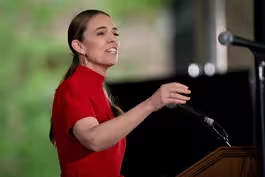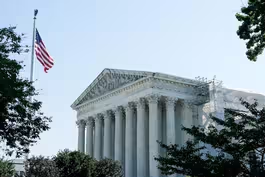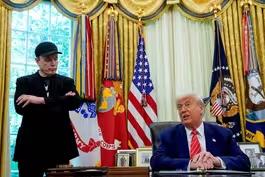
Facing Trump ban, trans troops reflect on military service
Clip: 6/6/2025 | 9m 33sVideo has Closed Captions
'We have earned our spots': Facing Trump ban, trans troops reflect on military service
Friday marks the deadline for the estimated 4,200 active-duty transgender military members to accept what the Defense Department calls "voluntary separation." Those who volunteer to leave may be eligible for separation pay while transgender troops who don’t leave voluntarily will be kicked out. Nick Schifrin spoke to two transgender service members about the choice they face.
Problems playing video? | Closed Captioning Feedback
Problems playing video? | Closed Captioning Feedback
Major corporate funding for the PBS News Hour is provided by BDO, BNSF, Consumer Cellular, American Cruise Lines, and Raymond James. Funding for the PBS NewsHour Weekend is provided by...

Facing Trump ban, trans troops reflect on military service
Clip: 6/6/2025 | 9m 33sVideo has Closed Captions
Friday marks the deadline for the estimated 4,200 active-duty transgender military members to accept what the Defense Department calls "voluntary separation." Those who volunteer to leave may be eligible for separation pay while transgender troops who don’t leave voluntarily will be kicked out. Nick Schifrin spoke to two transgender service members about the choice they face.
Problems playing video? | Closed Captioning Feedback
How to Watch PBS News Hour
PBS News Hour is available to stream on pbs.org and the free PBS App, available on iPhone, Apple TV, Android TV, Android smartphones, Amazon Fire TV, Amazon Fire Tablet, Roku, Samsung Smart TV, and Vizio.
Providing Support for PBS.org
Learn Moreabout PBS online sponsorshipAMNA NAWAZ: Today is the deadline for the# estimated 4,200 active-duty transgender## military members to accept what the Defense# Department calls voluntary separation.
Those## who volunteer to leave may be eligible for# separation pay.
Transgender troops who don't## leave voluntarily will be kicked out, and whether# they get separation pay remains to be seen.
Earlier this week, Nick Schifrin spoke# to two transgender servicemen about the## choice they face to leave the service# or stay and fight it out in the courts.
NICK SCHIFRIN: In one of President# Trump's first executive actions,## he declared that transgender service# members corrode military effectiveness## and -- quote -- "Adoption of a gender# identity inconsistent with an individual## sex conflicts with a soldier's commitment to an# honorable, truthful, and disciplined lifestyle."
Now, following legal battles, the Defense# Department is moving forward to expel## service members -- quote -- "with a# current diagnosis or history of or## exhibiting symptoms consistent with gender# dysphoria," which is officially defined as## six months of marked incongruence between# a person's experience and assigned gender.
Last month, Secretary of Defense# Pete Hegseth put the ban this way,## criticizing what he calls previous# policies that undermine military readiness.
PETE HEGSETH, U.S. Defense Secretary: We# are leaving wokeness and weakness behind,## no more pronouns, no more climate change# obsession, no more emergency vaccine mandates,## no more dudes in dresses.
We're# done with that (EXPLETIVE DELETED).
NICK SCHIFRIN: For a perspective, we# turn to Chief Petty Officer Ryan Goodell,## who has been in the Navy since 2011# and is an intelligence analyst.## He's choosing to leave the# military ahead of the deadline.
And 2nd Lieutenant Nic Talbott is a platoon leader# of a military police unit in the Army Reserve.
He## joined the Army a little over a year ago and# is suing the government over its policy and is## staying in the military, despite the deadline,# and therefore faces involuntary separation.
Thanks very much, both of you.# And I should say ahead of time## that the opinions you're going to express, I know,## are personal opinions and not those of the# Defense Department or your military services.
Ryan Goodell, let me start with you.
You are a cryptologic technician collection,# which is to say you collect and analyz.. communications.
Why are you taking the# separation?
And was this a hard decision?
CHIEF PETTY OFFICER RYAN GOODELL,# U.S. Navy: Yes, absolutely.
It## has been an incredibly difficult decision.
Honestly, seeing the opportunities and just seeing# the outside, right, because I have been in the## military for almost 14 years, seeing the outside,# I was like, you know what, I actually think that## I'm going to put a little bit of control into# this, what feels like an uncontrollable situation.
NICK SCHIFRIN: The military# calls what you're choosing## to do voluntary separation.# Is that what it feels like?
CHIEF PETTY OFFICER RYAN GOODELL: Certainly# not.
It definitely doesn't feel voluntary.
So I reenlisted back in December# for a reenlistment bonus,## and clearly stated in the memo I may# have to pay that back.
And that... NICK SCHIFRIN: If you were to# choose not to leave by the deadline?
CHIEF PETTY OFFICER RYAN GOODELL:# Correct.
If I chose the involuntary route,## I would be liable to pay that back.# And so that felt pressure enough to## help steer me in that -- quote,# unquote -- "voluntary direction."
NICK SCHIFRIN: Nic Talbott, you enlisted as a# reservist last March and you became an officer## in January, but you have actually wanted# to join the military for a long time.
Why?
2ND LT. NICOLAS TALBOTT, U.S. Army# Reserve: Joining the military is## something that I have felt compelled# to do fo.. And as I got older and became more experienced# and really gained some expertise in some areas## that are critical to what the military does,# that calling to serve has just grown in me.
NICK SCHIFRIN: And, at this# point, you're the lead plaintiff## in the first case against the# policy.
The judge sided with you,## but ultimately this policy is going forward# because of ruling by the Supreme Court.
Why did you choose to sue and why are you# choosing to fight to stay in the military?
2ND LT. NICOLAS TALBOTT: So this was my# second time being involved in a lawsuit## challenging this type of a ban.
Back in 2017, I# was one of the plaintiffs in Stockman v. Trump.
So, this time around, becoming reinvolved in# pursuing this fight was really a no-brainer## for me.
And now that I have been given# the chance to go out and meet the marks## and exceed the standards, I have proven# that I am able to be here and able to## keep up with other people and put on the# uniform and do my job every single day.
I can't, in good conscience, just give it# up, especially with no benefit or incentive## to do so.
As a reservist, as somebody# who's so new to the military, there is## nothing about the so-called voluntary process# that benefits me in any way, shape, or form.
NICK SCHIFRIN: Ryan Goodell, as I said,# the Defense Department makes this argument,## that individuals who have a current# diagnosis or history of or exhibit## symptoms consistent with gender dysphoria# are incompatible with the high mental and## physical standards necessary for military service.
What do you say to that argument?
CHIEF PETTY OFFICER RYAN GOODELL: I would# say that, honestly, I have become more## mentally sound since transitioning,# because, before I had a label, right,## for what I was feeling on the inside, I was# essentially battling a war within myself.
I would be a rock star at# work, doing great things,## getting high marks on all my evaluations, but# then I would come home and the voices inside## my head would get very loud and tell me that# you're living a lie, this isn't who you really## are.
And I could hide that at work, because,# in the military, you're a uniform, right?
The Navy colors are blue and gold, and that's all# you see.
Realizing and pursuing my truth has made## me more mentally stable.
My depression is gone.# I'm a better leader.
I can think more clearly,## I don't have those nagging self-doubt# moments anymore.
I know who I am,## and I lead very effectively.
And that's why, in# part, I was chosen to be a chief petty officer.
NICK SCHIFRIN: You received your gender# dysphoria diagnosis in June 2018.
You## started transitioning in December 2019.# What support did the military give you,## whether it was the institution# or your fellow service members?
CHIEF PETTY OFFICER RYAN GOODELL:# My fellow service members have been## nothing but supportive.
I draw# my strength from them.
They're## the reason I serve every day.
And# they have just been incredible.
They don't allow folks to# look at me the wrong way.## If they hear somebody misgendering or# using -- saying anything disparaging,## they're pretty quick to knock it out.
And I have# had that support up and down the chain of command.
NICK SCHIFRIN: When you hear# Nic sticking it out, basically,## wanting to stay in until they force# him out, what's your response to that?
CHIEF PETTY OFFICER RYAN GOODELL: It's incredibly# selfless.
And I think that comes from a lot of## self-discipline to be willing to put yourself on# the line.
And that's what we need in the military.
2ND LT. NICOLAS TALBOTT: We transgender# service members are living proof that## we belong in the uniforms that we have worked# so hard for.
We have earned our spots.
We have## earned our ranks.
We have earned our awards.# And our service should speak for itself.
NICK SCHIFRIN: You began your# transition in 2012.
What was## it like to serve having already transitioned?
2ND LT. NICOLAS TALBOTT: Nobody that I# have served with thus far has known that## I am transgender unless I have told them or they# have seen it posted on the Internet somewhere.
At the end of the day, what our# fellow service members care about## is whether or not we can put on our# uniforms and perform our duties.
NICK SCHIFRIN: A senior defense# official told reporters last month,## the primary means of identification# for those who do not voluntarily## separate will be through a service# member's periodic health assessment,## which tracks whether the service member's health# is -- quote -- "consistent with future service."
You, of course, are very public, so your## situation is perhaps different.
But what# is your sense of how the military will## identify people who do not choose to separate?
2ND LT. NICOLAS TALBOTT: As of now, unfortunately,## it's not entirely clear what that# process is going to look like for us.
NICK SCHIFRIN: What are you going# to do if you're forced to leave?
2ND LT. NICOLAS TALBOTT: I will figure# something out.
I am the kind of person that,## when one door closes in front of me,# I look for another door to open up.
I do like to emphasize the fact that# this fight is not over.
We still## have cases going on.
We have cases# going through the courts right now,## and this is not the end.
In the grand scheme# of things, sometimes, you lose a few battles## here and there and you still win the war at the# end.
And that's what we're facing right now.
NICK SCHIFRIN: Ryan Goodell,## I see you shaking your hea.. CHIEF PETTY OFFICER RYAN GOODELL: So, I would love# to take advantage of the significant investment## that the Navy has made in me and leverage the# skills that I have gained over my 13.5 years## to stay in this area and continue to serve# the nation, just in a civilian capacity.
I would love to stay within the intelligence# community.
It is part of a larger fight to serve## in any capacity.
And I would# like to continue to advocate## for transgender service members# and also transgender Americans.
2ND LT. NICOLAS TALBOTT: I think there are# a lot of very strong opinions out there## in the world about transgender# people and the LGBTQ community.
And I think the big takeaway at the end# of the day is, we're all human beings.## We all have our strengths, our weaknesses,# our faults, and our hopes and our dreams.
NICK SCHIFRIN: Nic Talbott, Ryan# Goodell, thank you very much to both.
2ND LT. NICOLAS TALBOTT: Thank you so much.
CHIEF PETTY OFFICER RYAN GOODELL: Thanks.
Brooks and Capehart on the Democrats' big problem
Video has Closed Captions
Clip: 6/6/2025 | 9m 18s | Brooks and Capehart on the Democrats' big problem (9m 18s)
Jacinda Ardern on keeping hope and empathy in politics
Video has Closed Captions
Clip: 6/6/2025 | 9m 3s | Jacinda Ardern on keeping empathy in politics and new memoir, 'A Different Kind of Power' (9m 3s)
Kilmar Abrego Garcia returned to U.S. to face charges
Video has Closed Captions
Clip: 6/6/2025 | 4m 10s | Kilmar Abrego Garcia returned to U.S. to face charges from Tennessee traffic stop (4m 10s)
News Wrap: DOGE allowed access to Social Security systems
Video has Closed Captions
Clip: 6/6/2025 | 5m 53s | News Wrap: Supreme Court allows DOGE to access Social Security systems (5m 53s)
The potential fallout from the Trump-Musk feud
Video has Closed Captions
Clip: 6/6/2025 | 6m 29s | The potential fallout for the country as Trump and Musk escalate public feud (6m 29s)
Providing Support for PBS.org
Learn Moreabout PBS online sponsorshipSupport for PBS provided by:
Major corporate funding for the PBS News Hour is provided by BDO, BNSF, Consumer Cellular, American Cruise Lines, and Raymond James. Funding for the PBS NewsHour Weekend is provided by...
















